May Newsletter
Volume 2, Issue 5
May 1, 2021
Special Points of interest

State Director of Referee Development
Welcome to the May issue of the MRC newsletter. By now, I assume many of you have had some games to officiate. Our world is still far from what it was in 2019 but it feels nice to be back on the field and see our friends.
I am writing this introductory article Sunday morning, just before I head out to watch some tournament matches. I spent most of yesterday walking around a soccer complex watching numerous youth games, including very young children’s matches with build-out lines. I saw a lot of young referees working hard on these games. They are not perfect. They make mistakes. But they were working hard and were doing their best. As one of the articles below discusses, the MRC has launched a new mentoring form primarily to be used with officials during their first few years. We hope to increase our focus on these new officials in the coming years.
We continue to certify new grassroots referees. Starting April, we offer 2 to 3 grassroots referee classes per month. So if you know anyone who is interested in becoming a referee, please guide them to the wizard that can be found on the MRC website.
The MRC hosted several fitness tests for regional referees and regional referee upgrade candidates. As you will see below, passing a fitness test is a part of the annual requirement for regional referees. It is also one of the important steps for those who wish to become a regional referee.
As always, our May newsletter is full of exciting stories and information. We are featuring Ms. Marie Smith as the former MRC member of the month. She was the State Youth Referee Administrator and State Director of Instruction. Our regular content includes Referees of the Month and Who’s Who. We are featuring Bill and Jordan Howard as the Referees of the Month, and Kevin Avery for Who’s Who. We interviewed Nicole Green, a national referee candidate, to ask about the importance of communication and personality while officiating. Ken Wikle has an article about refereeing. You will also find an article about upgrading to regional referees, fitness tests, and the names of new mentors who finished their licensing process in April.
Beyond this newsletter, please be sure to follow our Twitter (@MichiganReferee) and subscribe to our YouTube Channel.
Inside this issue
- Smith Interview
- How to Become a Regional Referee
- Tournament Season is Here
- Referee of the Month: Bill and Jordan Howard
- Our New Mentors
- Do You Want Feedback on Your Games?
- Regional Referee Fitness Test
- John Bieniewicz Scholarship Recipient Monthly Interview
- What is Your Call?
- Tip of the Month
- Who’s Who: Kevin Avery
- Dress the Part, Act the Part
Michigan Referee Committee: Marie Smith
Marie Smith
Former State Youth Referee Administrator and State Director of Instruction
For the May newsletter, we also had an opportunity to interview Marie Smith, a former State Youth Referee Administrator and State Director of Instruction.
How did you first get involved with officiating?
I have never played the sport I love the most, although I’ve participated in almost every other sport since I was a child. In high school, I joined every sport available for girls: basketball, tennis, and swimming. Three. That was the total of the girls’ sports program then.
A 4-year-old got me involved in soccer telling us, his parents, that he wanted to play soccer because he liked the uniforms (Not the answer to excite an athletic parent)! That fall I registered him in an Under-8 club team and was handed a pack of papers to fill out including a section that asked how we, the child’s parents, could help the league. There were many suggestions, but which one would fit my interest and schedule? Just how much were we willing to assist and support this wonderful opportunity for our child? I left blank the boxes next to “plan a picnic” or “plan the banquet” and certainly didn’t check the one saying “coach”- I didn’t know anything at all about soccer. The one option that caught my eye was “become a referee.” Hmm, I am an elementary teacher, I scrutinize and correct kids all day at school; this seemed to be an obvious fit.
A month later, Joe Lombardo, the director of officiating for Tri-Community Soccer Association, invited me to a class. Joe was not an instructor, but he was a USSF certified referee. It was a small class of two other adults and two kids, both of whom had been past students of mine. I completed the class successfully, was given a TCSA referee patch, and assigned a scrimmage. Remember, I still had never seen a soccer game played, and I was terrified. I bought a uniform, whistle, cards, and the only soccer shoes that weren’t plastic in my size. I was afraid I wouldn’t know what to do, where to stand, or how to move around the field. What if the parents yelled at me? What does a foul look like? How would I restart the game? My husband, our two sons, one adult from the class, and my father came along to lend support. I ran with the kids and chased the ball; I had no idea who had fouled, if someone was hurt or if it was really a handball? My face was the color of a cherry tomato by the end of an hour scrimmage. I could barely breathe and I was shaking.
The following Tuesday we met to get our assignments. We discussed problems we had seen on the field and clarified rules for everyone (If we did that today, maybe we wouldn’t lose so many referees every year). When the meeting ended, we volunteered to do matches during that week. But I never volunteered for a game; I was scared. Joe would offer games, I replied “Sorry, I’m busy that day,” “I have a meeting Wednesday,” etc. When I ran out of excuses out of embarrassment, I accepted a game or two. He kept asking, never giving up, and I kept showing up weekly so my son could continue playing. A year later, I enrolled in a USSF course and learned a lot more. Along the way, I met more referees at meetings, games, and at kids events. I learned so much from the people I worked with and each match was another opportunity to learn more.
Suddenly “I” was answering questions, encouraging referees, and helping to train new people. I started doing high school matches; I met more people, talked to coaches and attended trainings. The games were no longer fearful events but opportunities to be with my soccer friends. The people I worked with made a big difference in how I managed the games. They made suggestions, told me about trainings they had attended, and explained stressful situations they had experienced, and informed me of new law changes. Many of my referee friends are still among my closest, most-trusted friends.
Next up was to become a college referee with MISOA. It provided me with more new friends, experiences, trips to distant colleges and more chances to improve. The high school and collegiate matches, as well as the amateur matches, gave me many opportunities to expand my experiences. Suddenly my gender became very important. It was not unusual for spectators to call out, “Get off the field, this is a man’s game!” “Go back into the kitchen!” “Girls shouldn’t be doing boys games.” It was surprising to hear such comments but I guess it was to be expected; there were only a few female referees and although I knew most of them, I never considered what I was doing to be unusual (I especially enjoyed the “kitchen” remarks, because I didn’t have much time for the kitchen after I discovered soccer). Mr. Barnes sent my friend Gina and me to a senior tournament in Rockford, IL, to officiate in the Region II tournament finals. Another female referee named Sandy was sent, too. At the end of the tournament, we were all assigned to the open women’s final. To our surprise, hundreds of spectators surrounded the field to watch a type of “freak show” of lady referees doing a real match. That was fun, but luckily, we did a decent job because no one criticized our performance.
When and how did you become the SYRA and SDI of Michigan?
In 1992, I was appointed State Youth Referee Administrator (SYRA), a challenging position because the MSYSA president did not approve of having young referees officiate youth games. I assigned many young, skilled referees to State Cup matches. One young official, Jonathan Noocha, worked several matches as well as the Under-16 boys’ final. Jon did a wonderful job which opened the door for me to include more young referees to work youth matches. Region II also sent Jon to the National Youth Tournament that year and a year later he was assigned to one of the finals in the U.S Youth Tournament. The referees and players welcomed their practical knowledge of the game. Players especially enjoyed having the young referees who knew the game as a player as well as a referee.
In 1999, Dale Brasseur appointed me to be State Director of Instruction (SDI). At that time, referee development programs in Michigan and elsewhere used overhead projectors and transparencies to present instruction which were cumbersome and time consuming since they slid about and onto the floor so often. At the same time, my job at school had changed from classroom teacher to Media Specialist for my building of 500+ students and 30 teachers. Teachers and administrators were starting to gravitate away from the use of transparencies and discovering PowerPoint software that could easily be edited, shared, and transported. Dale, then SRA, and I thought this could be useful for referee training but were unsure how the National Office would take to that idea. Several months later at a National SDI Meeting, I spoke to two advisors from the Chicago office who were receptive to the benefits of a technology switch to computers and software. On return from lunch, I brought up the technology idea; there was discussion and some pushback but in the end, everyone except two members voted for the switch to adding computerized technology and projectors to our recerts and new entry level classes. Our state was open to trying something new in instruction. I explained to Dale what had happened at the meeting. Dale ordered a projector and a computer for each DDI for instruction in their areas of Michigan. I began going to areas around the state and demonstrating how to use the equipment and how to present instruction. Eventually Carlos replaced Dale as SRA and made sure there were several projectors and laptops for each region’s growing needs. He was very proactive to our needs.
What was your experience as the SYRA and SDI like?
Except for law changes, the National Program allowed us to organize and present lessons geared for our state. A few of our Michigan National Referees asked how they could assist me in developing independent topics to present at the numerous recerts that were offered throughout the state. Many of the topics included lessons they had seen at their National training classes making all of our officials more knowledgeable. The goal was to make sure all of our officials were calling things the same way rather than only what each region was developing locally.
What do you like about being involved in refereeing?
Refereeing has always been exciting for me. I’ve been able to work with many different people at various stages of soccer experience. The players all have different needs, whether they are just starting out in soccer or playing professionally. Referees must be flexible and vary their methods of officiating depending on the skills of the players, as well as, the other officials they work with. We must be alert to whatever is going on around you; the intent of the players, behaviors of coaches and skill level that is presented. Each match is unique and requires us to adjust for each level of play. I enjoy working with new many people and like to make suggestions regarding the problems we might encounter. Over the years, I’ve been honored to work with all levels of players; whether Special Olympics, Under-6, high school, college, seniors, semi-pro, or professionals. For many years I worked with the Rockers and Neon Professional teams in various capacities as a volunteer. Everyone wants to know that their referee is able to fairly apply the laws of the game. You must go to each match ready to give them the best game you’re capable of calling. Currently, I try to stay active by working with youngsters who are still learning. If I don’t feel I’m able to do a match, I won’t accept it. The game may require more than I’m able to give.
My favorite recollections of soccer were the World Cup ’94 matches at the Silverdome in Pontiac, Michigan. Four matches were played there and my kids, I, Gina, and her kids worked for hours putting cheerleader pom-poms on each seat in the lower bowl of the facility the night before the opening game. The U.S. played the first match and most of the people there were people I knew. When the first round of World Cup closed, the U.S. Women’s National Team played the Canadian National Women’s Soccer Team. Gina and I were asked to drive U.S. Women’s Team to Metro-Airport the next day. That team went on to win the Olympics and the Women’s World Cup. That was truly a time I’ll never forget. Referees from Michigan, members of the Michigan Soccer Association (MSA), the Michigan Youth Soccer Association (MSYSA) gave freely of their time and talents to welcome people from around the world to the State of Michigan. The person who organized those events was a female referee, Julie Illacqua, past president of the MSA and future director of referees for the United States.
Soccer, the game I’ve never played, has provided me with experiences, friendships, and challenges for nearly 40 years. I never thought it would last much beyond my sons’ involvement in youth games; who knew it would take me to ODP and professional levels? (It might have been easier to plan the league banquet, but what a ride I would have missed…)
How to Become a Regional Referee
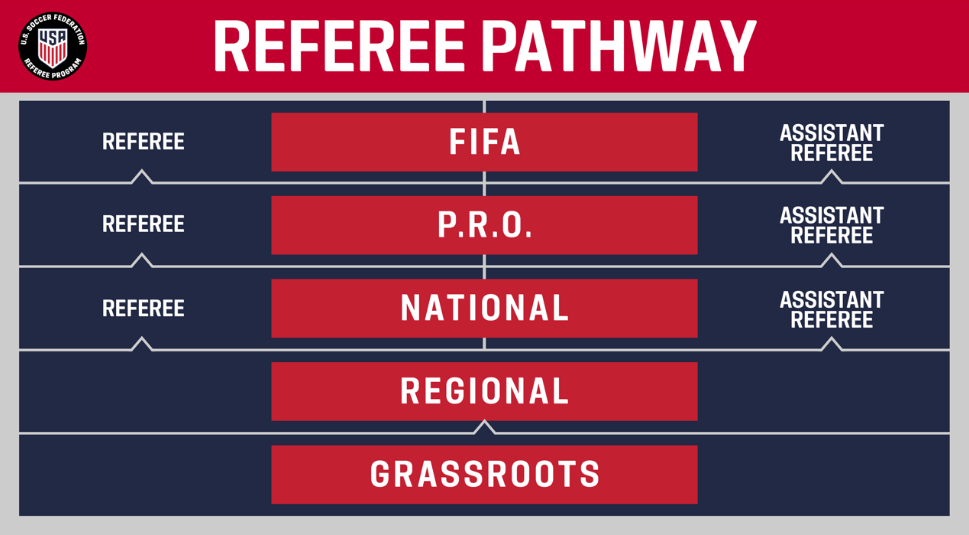
With the U.S. Soccer’s new referee pathway, everyone becomes a grassroots referee, first. Although over 90% of registered officials are grassroots referees, some aspire to upgrade to become regional referees. In the old referee grade system, becoming a regional referee is equivalent of becoming a Grade 6 state referee.
In order to become a regional referee, you must be at least 18 years old and must have been registered as a referee at least for the last 3 years. You also need to have officiated at least 50 games as a referee and 25 games as an assistant referee at the adult amateur level. Unfortunately, youth games including State Cup, ECNL, etc. do not count toward this requirement, unless they are U-18 or U-19 games. Unaffiliated games such as high school and college games do not count, either. Once you have met these requirements, you can apply to be considered for an upgrade.
Every winter around February, the MRC sends out an email to its referee asking if they meet all of these requirements and if they would like to upgrade. Once their age, experience, and game counts were confirmed, they are notified that they are now a regional referee candidate. These candidates are invited to a fitness test as the first step. These tests, as will be mentioned elsewhere in this newsletter, takes place in spring. It is vital that those who wish to become a regional referee train during winter so they can pass the fitness test.
If a candidate passes a fitness test, they will be evaluated on matches. If they do not pass a fitness test, they are no longer upgrade candidates. Those who successfully passed a fitness test will be evaluated on 3 games: 2 at the adult amateur level and 1 at the highest youth level. The third match may also be an adult game. The youth game must be “at the highest youth level,” meaning that it has to be at least the State Cup final or semi-final match. ENCL, NLC, and other regional and national competitions will also count. But the game has to be either a U18 or U19 game. Successfully passing all three evaluations will move the candidate very close to the regional referee badge.
Once the evaluations are complete, candidates will have to make sure that they are compliant with any relevant requirements (e.g. SafeSport), take the law test, and attend required training session(s).
If you want to become a regional referee one day, it is never too early to start working toward your goal. One piece of advice the MRC has for you is to keep track of your game counts. You will be required to submit your game record and if you cannot supply your game history, you will not become a candidate. Keeping track of your games will help you get closer to your aspiration.
Tournament Season is Here
We have had a few tournaments in the last several weekends. In April and May, we have several tournaments on one weekend. If you would like to spend a weekend on a soccer field, these tournaments are great places to be.
The MRC is working closely with some tournament assignors so that licensed mentors are in presence at various tournaments. These mentors are not there to “evaluate” you. They are there to watch a part of your game and to give you some feedback. They will also send you a feedback sheet via email. So if a mentor approaches you and says hello, don’t be alarmed! Ask many questions. They have a lot of experience and knowledge that they are eager to share.
One of the tournament assignors who the MRC work with is Erich Shrewsbury. Here is a short message from Erich, “If you would like to do any tournament, please go into your game officials account and on the left-hand side click MY PREFERENCES, once that opens please click LEAGUE/TOURNAMENT PREFERENCES and you will see all the league/tournaments that you can sign up for. Find the one or multiples you are looking for and check that box. You can email me and I will confirm that you have signed up properly.”
You can find the list of tournaments that Erich is assigning here.
His email address is: eshrews @ gmail.com.
Referee of the Month: Bill and Jordan Howard
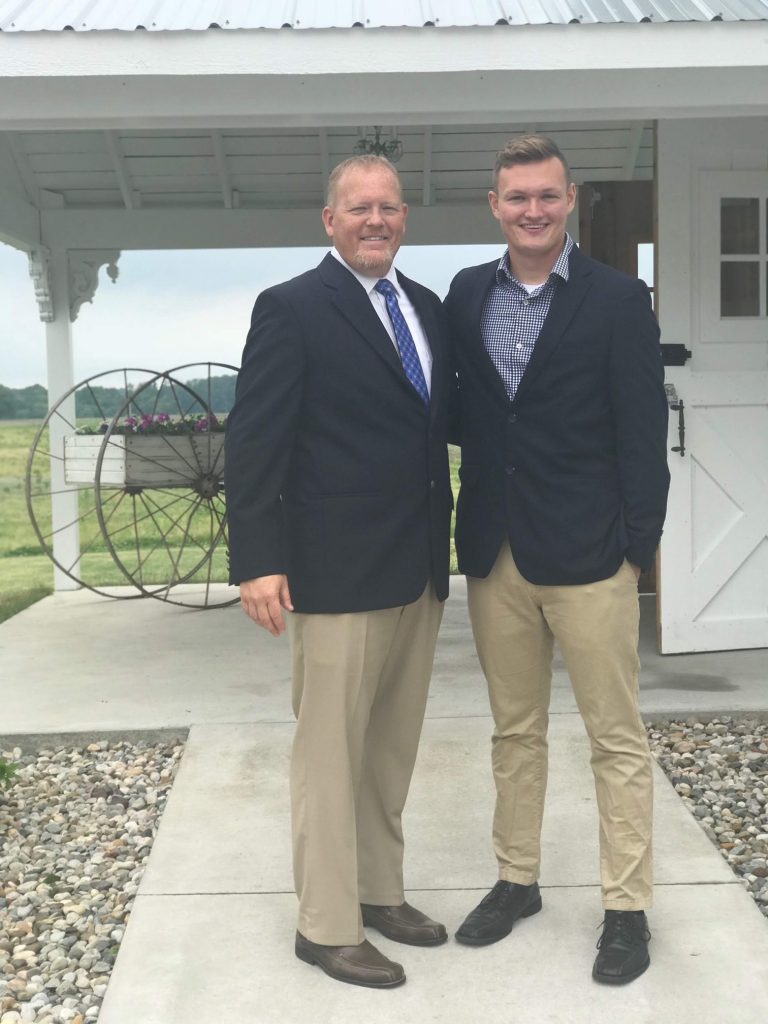
Bill: I got into officiating because Jordan was playing soccer. I was watching and was getting frustrated with his referees. After a while I said to myself “stop!” If I’m gonna yell I need to understand what the laws are in order to know if the referees are right or not. After I got certified I realized they were still terrible. I worked hard to know the laws, to know the right mechanics, to understand fouls at all levels of the game by working with referees that were patient, knowledgeable, and willing to teach.
Jordan: I was playing and seeing my dad at games and was curious as to why he enjoyed getting screamed at. After a while I was convinced to go get certified. We started doing tournaments and getting better. My first big tournament was when I was 14 in Holland. They needed someone to run the line of a U-18 game with my dad in the middle. Afterwards I was grinning from ear to ear. That was when I realized how passionate I was about the game. We started working higher level games, more tournaments across the state. After a few years of hard work we started to travel around the country: Ohio, Illinois, Indiana, North Carolina, Florida, Colorado, California, Texas, and Kentucky.
Bill: This led to us starting to do adult club and college games; at first junior colleges, to NAIA, NCAA, and now Jordan is starting to do Big 10 and D1. Although I continue to officiate at all levels, my concentration is starting to go more towards mentoring. I still do regional and men’s futsal, MASL/PASL and college, but my goal is to pass on my knowledge to younger officials.
Jordan: I’m proud to see my dad take on an administrative role as West Michigan DDRD as well as a mentoring role and continue to support me and other referees like me as I continue my journey towards being a professional referee. He has supported me as I’ve gotten my first adult assignments, semi-pro games, getting my regional and ECSR badges and now working towards my national. I know I can count on him if I need to.
Bill: Even though I am excited for Jordan’s progression, there was a moment of our career together when both of us had U-16 centers at state cup playoffs in Saginaw on neighboring fields and synchronizing our games to start at the same time. I could not have been any more proud as a father to see my son learn a new passion and do it together.
Thank you to all of our fellow referees and a special thank you to the MRC. Your patience, enthusiasm, instruction, dedication and investment in us and the referees of Michigan has and will continue positively affect us, players, coaches and parents forever.
Our New Mentors
Since April 1, the following mentors have finished their licensing process and have officially become U.S. Soccer Referee Mentor.
Ken Wikle
Aaron Scherer
Eduardo Rodriguez
Tony Bucket
Ray Kuhr
Pay Mathieu
Now we have 3 national referee coaches, 2 referee coaches, and 53 mentors in the state. We have 2 more mentor candidates who are finishing up the last part of their requirements.
Do You Want Feedback on Your Games?
With thousands of referees working on hundreds of games every day across the state, only a small fraction of games can be observed by mentors. But if you want someone to come watch you officiate and give you feedback, let us know! It is often difficult to know what you are doing well and what you can do better as a referee unless someone watches you and gives you advice.
Here is the latest list of DDRDs across the state.
Metro West: Rich Gilbert and Jeff Dornseifer
Metro East: Brandon Barlog and Alex Plum
Flint/Saginaw: Matt Krause and Stan Krajkowski
North: Bruce Falberg and Kevin Avery
Lansing/Jackson: Andrew Hoard
Kalamazoo: Jim DeBrabander and Bill Wilkinson
Grand Rapids: Kristy Bos and Bill Howard
Southwest: Simon Blackwell and Luis Aguirre-Rivera
Regional Referee Fitness Test
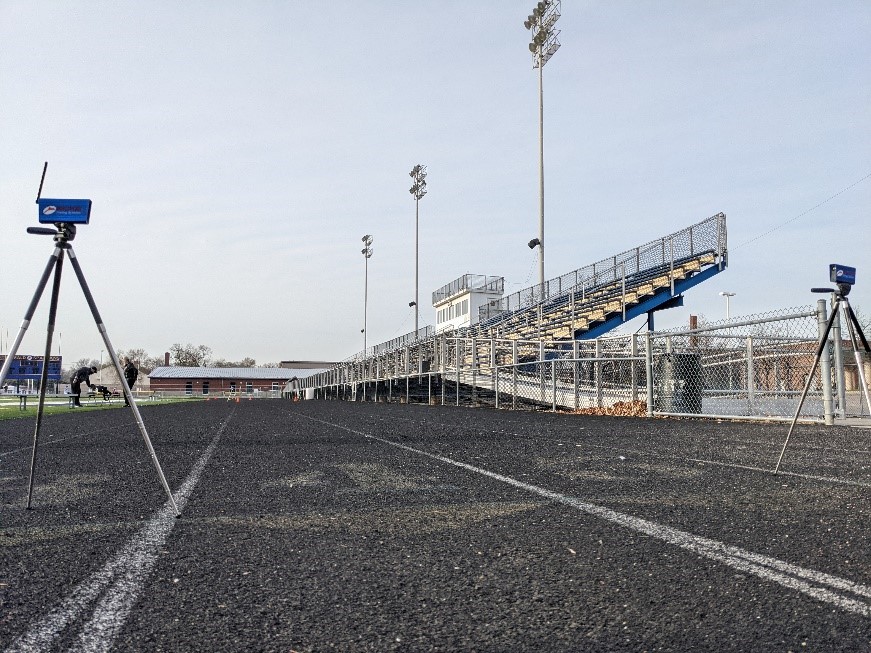
As is mentioned above, all regional referees and regional referee candidates must pass a fitness test to be eligible for the 2022 regional referee badge. The MRC has hosted several fitness tests across the state in April.
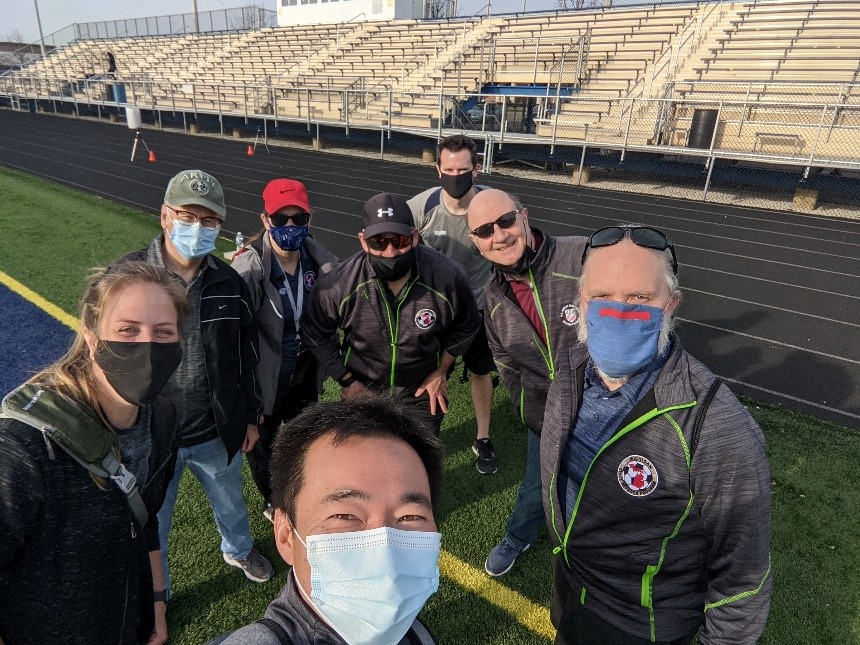
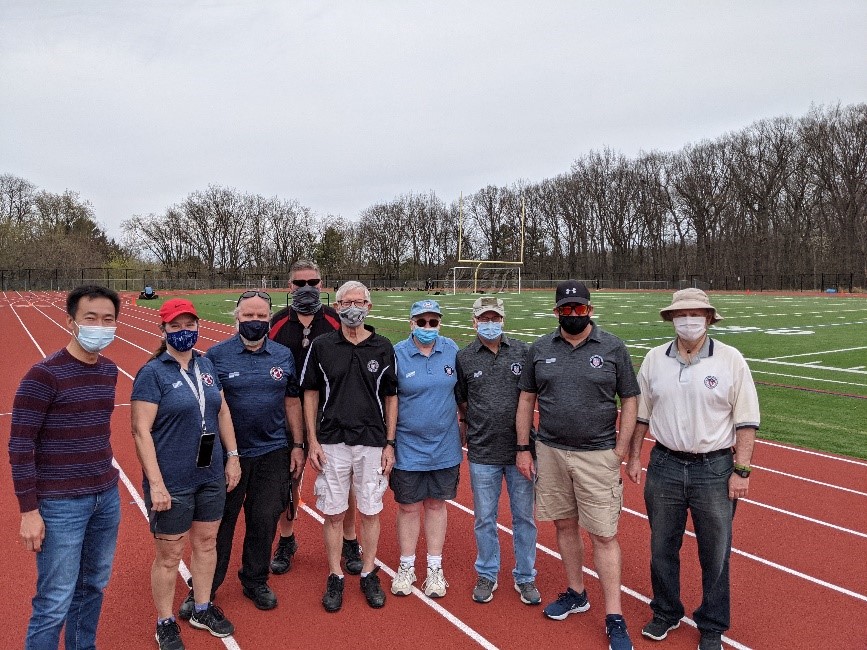
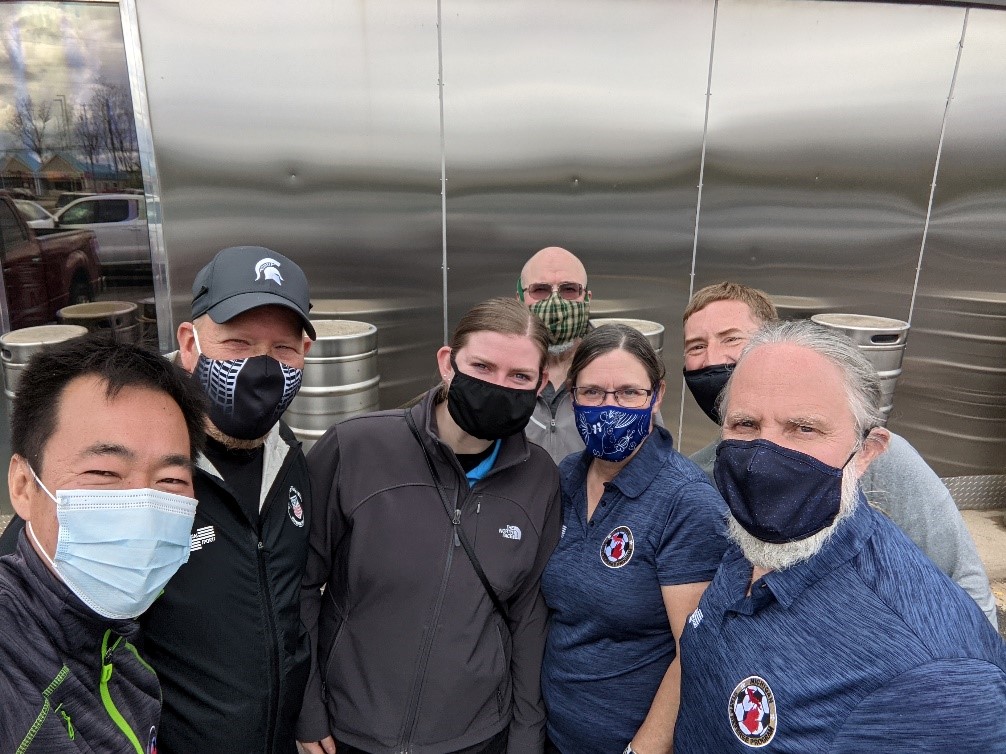
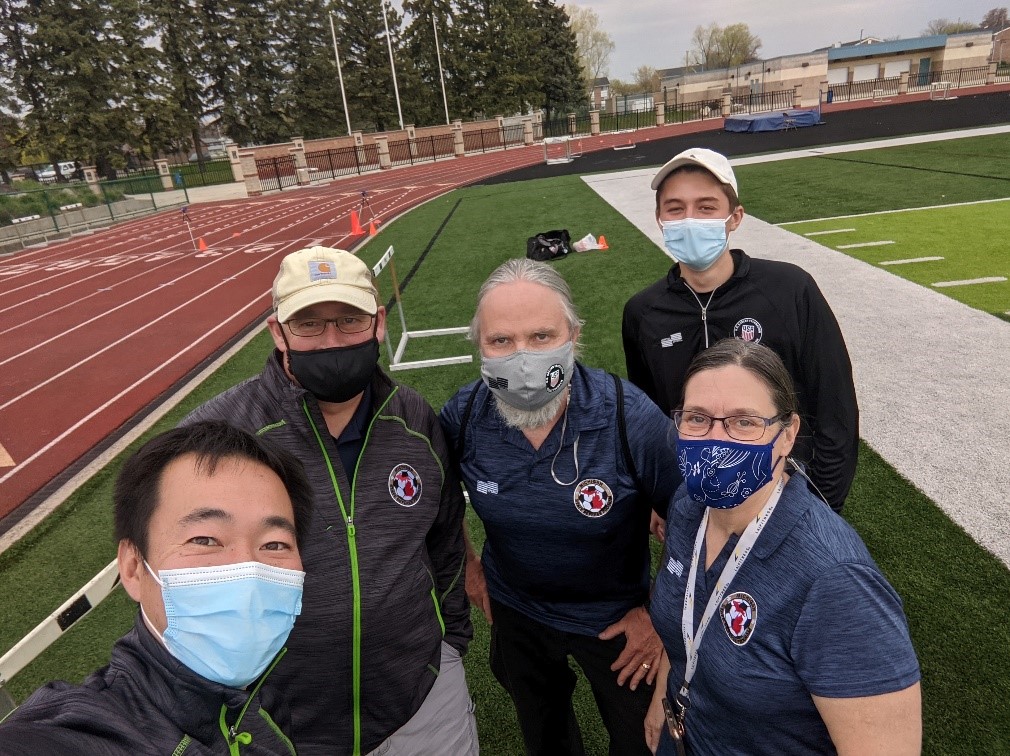
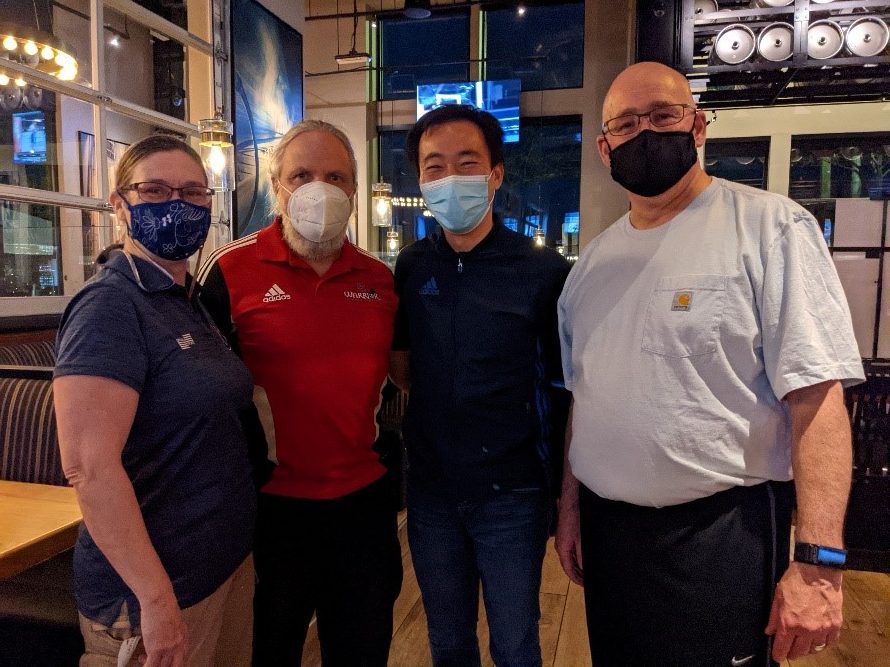
John Bieniewicz Scholarship Recipient Monthly Interview

This month we will spotlight another previous John Bieniewicz Memorial Scholarship recipient. In the third interview of this series, we were fortunate enough to sit down with Joe Liblong. Below is the transcription of the interview we conducted with Joe.
What college/trade school did you attend?
Aquinas College.
What are you studying?
I am majoring in clinical exercise science.
How has the scholarship benefitted you?
The scholarship helped me make school more affordable.
How are you carrying on John’s legacy?
I am carrying on John’s tradition by staying involved in the soccer and referee community.
What advice do you have to high schoolers or young referees?
My advice to young referees and high schoolers is to really explore all the avenues available and don’t be so focused on college if you don’t enjoy school. There are many trades that need young employees and will teach you good life skills.
Thank you, Joe.
Thank you.
John Bieniewicz was a long-time soccer referee who passed away on July 1, 2014 after being assaulted and sustaining a fatal injury while refereeing a soccer game. To all who knew him, John’s passion for soccer was only surpassed by his love and devotion for his family. In John’s memory and in conjunction with his family, The Michigan Referee Committee has established a scholarship fund for five high school seniors who share his passion for soccer. Attached below is information regarding the John Bieniewicz Golf Outing which helps fund the scholarships and the scholarship application for anyone who is interested in applying.
Reminder: The John Bieniewicz Memorial Golf Outing is August 7. Please see the above brochure if interested in participating or sponsoring the event.
Instagram: @jbieniewicz_scholarship Facebook: John Bieniewicz Memorial Scholarship
What is Your Call?
In the April newsletter, you were given a clip of a challenge and a possible disciplinary action. The survey asked you to identify if a foul existed, and if it did, by whom with possibly with what disciplinary action.
The April video was this.
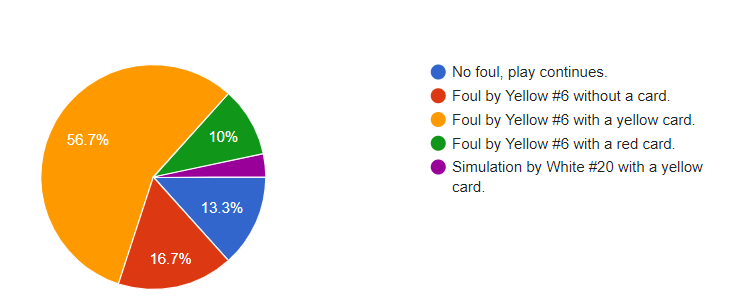
This month, more than a half of the respondents had the right answer: foul by Yellow #6 with a yellow card. In this video, the attacker (White #20) plays the ball first. The defender (Yellow #6) comes in late and steps on the white player’s foot from the side. The force of the contact is not high. The yellow player stretches his leg out. This means that his body weight was not on his opponent’s foot. However, the challenge was late and the contact was made with the bottom of the shoe (cleats) against the inside ankle.
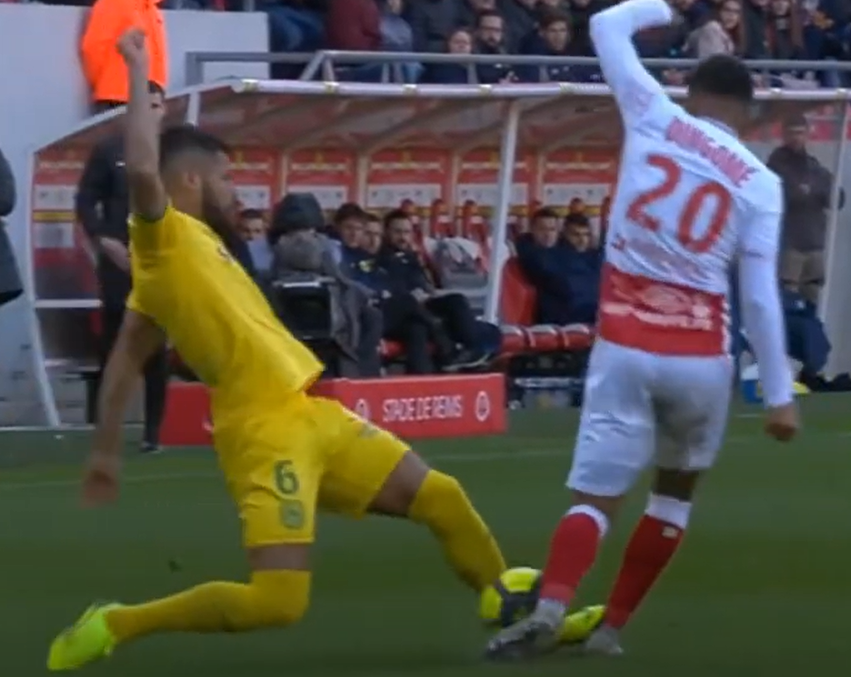
We must consider which part of the body made contact with the opponent (i.e. the bottom of the shoe) and which part of the body received contact (ankle, not covered by the shoe). Therefore, a yellow card must be shown.
For this month, we have selected another video on challenge and a possible disciplinary action. You can access the video here.
You can submit your answer here.
Tip of the Month: Personality and Referee Communication

Last month, Nicole Green, national referee candidate, talked about the importance of communication and personality to become an effective referee. This month, we interviewed her to learn more about the importance of communication and personality.
Specifically, why is communication and personality important to begin with? What are some good examples of successful communication? Furthermore, how can we acquire more effective communication skills that we can use on the field?
You can watch the full interview here.
Who’s Who in Michigan: Kevin Avery

District Director of Referee Development (North) and Referee Mentor
What roles do you play in the referee community?
I am a USSF Regional Referee, Grassroots Referee Mentor, and, along with Bruce Falberg, one of the DDRDs for Northern Michigan. I am also the local assignor for high schools in the Cherryland region around Traverse City.
What do you do outside of your referee responsibilities?
Outside of my work in the referee community, I teach online courses in composition and literature for a community college in Kentucky (where I once worked full time before moving back to Michigan). I am also president of a literary non-profit called Michigan Writers. We publish an independent literary journal, Dunes Review, short books of poetry and prose, and promote various writing-related activities amongst our membership.
When I am not refereeing, working, or volunteering, I enjoy sharing various outdoor recreational pursuits (hiking, skiing, paddling, camping, traveling) with my wife and our two energetic girls (ages 7 and 4).
Why did you start refereeing?
I still remember working my first game, over 25 years ago. A local coach knew I had been a good soccer player, and he needed a referee for a U-14 rec game on short notice. I was 19 years old, uncertified, and had never even considered refereeing a game before.
I agreed to work the game and ended up running the center without ARs. The moment of truth was a shot off the crossbar. An attacking player scored from the rebound and the defending team’s coach claimed the scorer was offside when the shot was taken. I can’t remember what decision I made (I had no way of really knowing the right call, since I had no ARs), but the game was decided by a single goal. What I do remember is feeling a strong responsibility to the players to get the call right, and then, after the game, studying the law book to figure out what I could have done better.
It took me another 10 years of refereeing off and on in various rec leagues before I really stuck to it, but I always remember that game because it was formative for me in beginning to see refereeing as a new kind of challenge. As a player, I always strived for constant improvement; my first game as a referee showed me that refereeing could offer that same sort of ongoing competitive satisfaction.
What do you enjoy most about being a referee and mentor?
Aside from being part of a lively community, keeping fit, and giving back to a game I love, what I enjoy most about refereeing is that every game is a physical, emotional, and intellectual challenge.
What many players, coaches, and fans don’t understand about referees is that we, too, are very competitive. We are out there to perform well and strive toward continuous improvement. But referees are not really competing against anyone. Instead, we compete on behalf of fairness. Our goal is to ensure that a passionately contested match unfolds in as fair a manner as possible. I love that every game, no matter the level, presents a different set of challenges, but also offers various ways to utilize my skills and knowledge to help provide a fair and fun competitive environment.
Now that I am a Referee Mentor, I hope to be able to inspire young referees and to share the skills and knowledge I have accumulated over the years.
What is the best refereeing advice you’ve ever received?
The best piece of refereeing advice I’ve ever received is this: For many players, especially kids, playing in a soccer game is the part of the day that they will look forward to most. Even if the game you are assigned is in a lower-level league or between teams who are not very experienced, that game is likely the highlight of the day for those players. As a referee, it is important to respect that, and to approach every game with the same level of enthusiasm.
Dress the Part, Act the Part

Regional referee first registered with USSF in 1978
Observing referees regularly and offering feedback leads me to a few conclusions about what I see.
I tell referees that, in a way, being a referee is an “acting job.” In order to successfully perform the job, referees have to dress the part and act the part.
Dressing the part includes wearing the U.S. Soccer referee uniform properly to present a professional appearance to players, coaches, and spectators. This includes wearing a clean jersey tucked into the shorts, proper referee socks worn over the calves, the proper year referee badge on the left chest, and solid black or mostly black soccer shoes. U.S. Soccer allows referees to wear a baseball cap to protect themselves from the sun. A black baseball cap with minimum or no logos is most appropriate.
I see many referees wearing warm up pants while officiating. While this may help keep warm on a cold day, you could ask yourself if the players are wearing shorts to play why can’t the referee wear shorts too?
Presenting a professional appearance is the first step in giving a positive first impression to the players, coaches, and spectators. Not giving a positive first impression can get the game off on the wrong foot. It is not that hard to dress professionally, so why not?
Acting the part of a referee is more complex. What are the teams and spectators looking for? They want someone who is fair to both teams, takes charge of the game, and is actively involved performing the role of referee.
One of the biggest errors I see young referees make is that their body language is poor. The referee should make decisions with their head up and their chest out using a clear immediate arm signal showing which direction for restart, making decisions with a strong whistle signal that both teams can hear. Any deficiencies in body language or whistle volume will invite dissent. I have seen young referees that are 100% correct in all their decisions but due to a poor whistle volume and/or poor body language invite dissent from the touchline.
Running, jogging and sprinting to keep up with play demonstrates the referee’s engagement in the game and trying to get in the best position to observe play. Just walking back and forth across the center circle does not demonstrate active involvement in the game and will cause the referee to misjudge contact, miss AR flags, and misjudge ball in and out of play.
Another timely issue concerning young referees is the use of smartphones. A referee should certainly not use the stopwatch function on their smartphone to time the halves! Getting a smartphone out of your pocket while officiating sends a message of distracted activity. Coaches and spectators will assume that the referee is reading a text message during the game and not watching play. I would suggest that players, coaches, and spectators not ever see a referee looking at his smartphone while the game is in progress. Even looking at the phone while walking to the referee’s area is a marginally acceptable practice. Once out of sight of the teams and fans looking a smartphone is OK.
You may not realize it, but as a referee you are under constant scrutiny and unprofessional conduct, no matter how slight, will be noticed and will affect how you are treated. The adage “Dress the part and Act the Part” is the byword.
Michigan Referee Committee
State Referee Administrator (SRA): Carlos Folino
State Referee Chairman (SRC): James Wheeler
State Youth Referee Administrator (SYRA): Ronald Grobbel
State Director of Referee Development (SDRD): Yuya Kiuchi
State Director of Assignors (SDoA): John Corbett
State Director of Futsal (SDF): Richard Gilbert
Email addresses are the title in parenthesis plus @michiganrefs.org
Please reach out to us!
If you have any referee-related stories to share or someone you think should be featured in this newsletter, please reach out to us at sdi@michiganrefs.org.
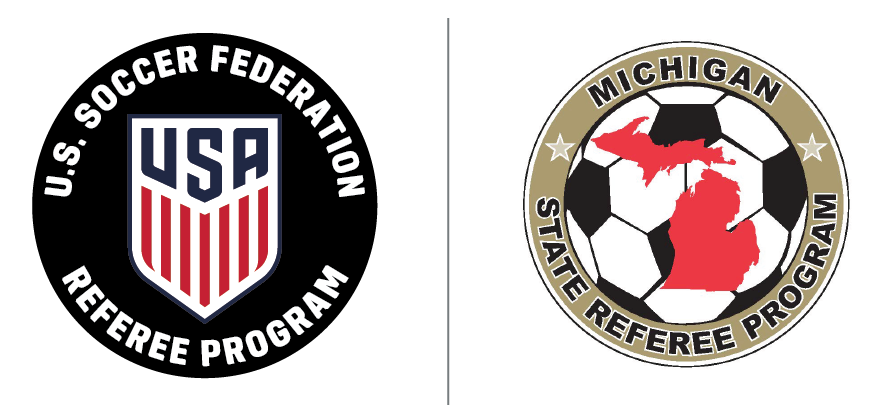
MRC announcements
If you know anyone who would like to become a referee, we offer numerous grassroots referee classes, as well. You can find relevant information here.
Contact one of us on the Michigan Referee Committee if you have any questions.



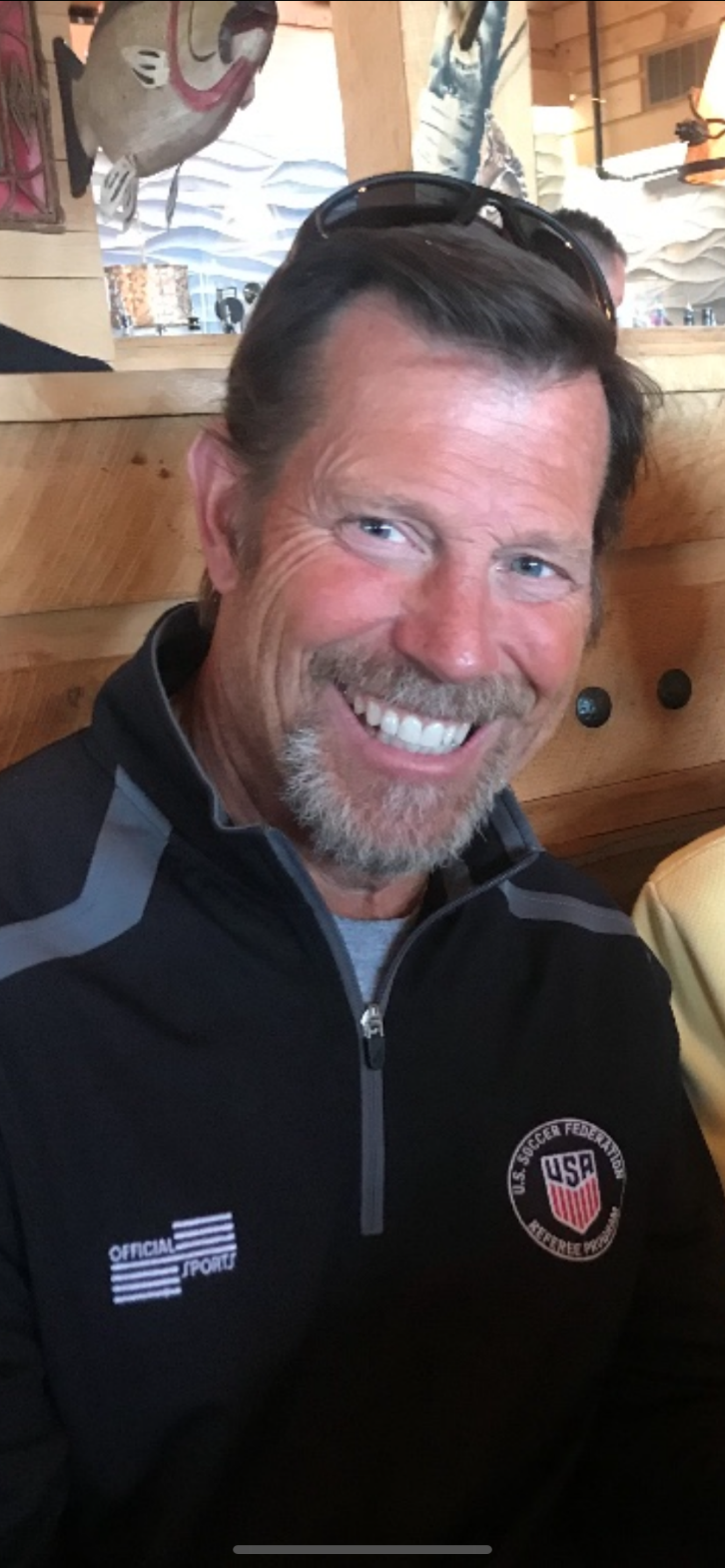
No Comments
Sorry, the comment form is closed at this time.